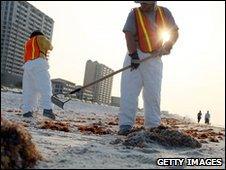US Adm Thad Allen says oil clean-up 'will take years'
- Published
The US Coast Guard chief says cleaning up marshlands affected by the Gulf of Mexico oil spill will take years.
Adm Thad Allen said oil giant BP needed to do better at getting money to people and businesses affected by the spill.
Some 11,000 barrels of oil were being trapped by a containment cap, he said.
President Barack Obama defended his response to the spill, using some of his toughest language yet. He said he had frequently consulted with experts in order to learn "whose ass to kick".
"I was down there a month ago before most of these talking heads were even paying attention to the Gulf," he said in an interview with the NBC network.
"I don't sit around just talking to experts because this is a college seminar. We talk to these folks because they potentially have the best answers so I know whose ass to kick," he added.
The president - who has come under criticism that he has not shown enough leadership or anger over the disaster - told Americans they would "get through this crisis", despite the damage to the economy.
Mr Obama told reporters he was committed to seeing the Gulf region restored to a condition better than it was before the Deepwater Horizon rig exploded and sank on 20 April, killing 11 workers.
The leaking wellhead is currently spewing out between 12,000 and 24,000 barrels of oil per day.
'Greater capacity'
Meanwhile, Adm Allen, the coordinator of the clean-up operation, told reporters it would take "a couple of months" to clear the oil slick from the surface of the Gulf.
But, he said: "Long-term issues of restoring environments and habitats will be years."

Four US states have now been affected by the Gulf of Mexico oil spill
He said that while BP had nearly doubled the amount of oil being funnelled from the leaking wellhead since Friday, it was now "trying to increase that production rate, close the venting valves and move to a greater capacity".
He said BP was hoping to move a second production platform into the area to increase the amount of oil that could be siphoned off.
Adm Allen added that BP was also preparing a bigger rig to process a greater capacity of oil in severe weather. Hurricane season in the region opened last week.
White House spokesman Robert Gibbs warned, however, that collecting oil through the containment cap fixed over the leaking well remained a risky operation.
Response cost
BP said on Monday that the cost of its response to the disaster in the Gulf had reached about $1.25bn (£860m).
This number does not include $360m (£248m) for a project to build six sand berms to protect Louisiana's wetlands from the spreading oil, BP has said.
Oil from the Deepwater Horizon spill has been found on beaches and wetlands along more than 100 miles (161 km) of coast from Louisiana to the Florida Panhandle.
An observation flight spotted a sheen of oil 150 miles west of Tampa, Florida, on Sunday.
Tar balls continued to wash ashore on Monday in Pensacola, Florida, and the popular tourist town of Panama City, in the same state, expected oil to reach its beaches within 72 hours.
"We have just entered the area of uncertainty for about half of our beach," said Dan Rowe, president of the Panama City Beach Convention and Visitors' Bureau.
He added: "We are still hoping tar balls don't show up here, but we are putting the contingency plans in place and everyone is out there looking at the beach and inspecting it."
Public response
Both BP and the US government have been criticised for their responses to the spill.
According a survey released on Monday by ABC and the Washington Post, nearly three out of four Americans say that the oil spill in the Gulf of Mexico is a major disaster, and the majority of those surveyed want legal action to be taken against BP and its partners.
Eight in 10 people surveyed criticise the way BP has handled the spill, and 51% of people say they feel strongly that the federal government should pursue criminal charges against BP and the other companies involved in the disaster.
Nearly seven in 10 gave the government's response to the spill a negative rating.
The US states of Louisiana, Mississippi, Alabama and Florida have so far been affected in the six weeks since the spill began.